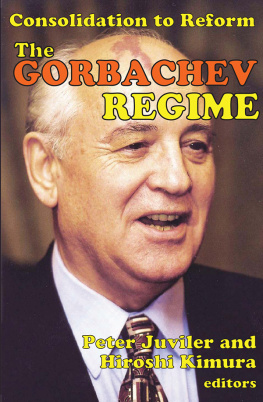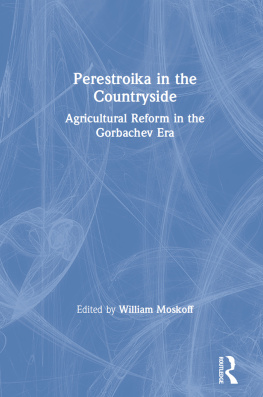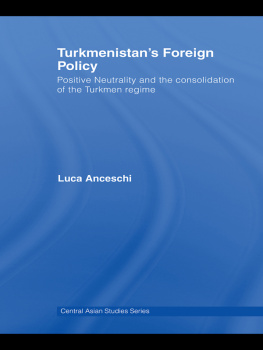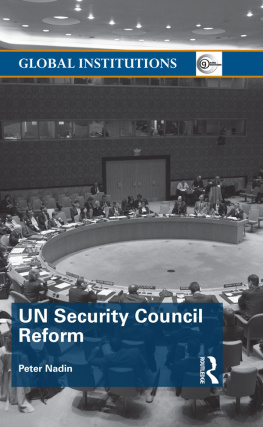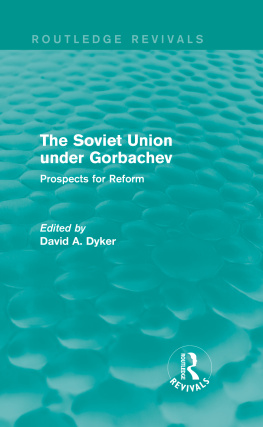The GORBACHEV REGIME
Consolidation to Reform The GORBACHEV REGIME
Peter Juviler and
Hiroshi Kimura
editors
First published 1988 by Transaction Publishers
Published 2017 by Routledge
2 Park Square, Milton Park, Abingdon, Oxon OX14 4RN
711 Third Avenue, New York, NY 10017, USA
Routledge is an imprint of the Taylor & Francis Group, an informa business
Copyright 1988 by Taylor & Francis.
All rights reserved. No part of this book may be reprinted or reproduced or utilised in any form or by any electronic, mechanical, or other means, now known or hereafter invented, including photocopying and recording, or in any information storage or retrieval system, without permission in writing from the publishers.
Notice:
Product or corporate names may be trademarks or registered trademarks, and are used only for identification and explanation without intent to infringe.
Library of Congress Catalog Number: 2009003713
Library of Congress Cataloging-in-Publication Data
The Gorbachev regime: consolidation to reform/Peter Juviler and Hiroshi Kimura,{editors].
p. cm.
Originally published: Gorbachevs reforms:U.S. and Japanese assessments. New York: A. de Gruyter, c1988.
Includes bibliographical references and index.
ISBN 978-0-202-36269-4 (alk. paper)
1. Soviet UnionPolitics and government1985-1991. 2. Gorbachev, Mikhail Sergeevich, 1931-3. Soviet UnionForeign public opinion, American. 4. Soviet UnionForeign public opinion, Japanese. 5. Public opinionJapan. 6. Public opinionUnited States. I. Juviler, Peter H. II. Kimura, Hiroshi.
DK288.G6635 2009
947.0854-dc22
ISBN 13: 9780202362694 (pbk)
To John N. Hazard
Mentor and Friend
CONTENTS
Chapter 1
Gorbachevs Agenda: Domestic Reforms and Foreign Policy Reassessments
Gail Warshofsy Lapidus
Chapter 2
Prospects for Perestroika: New Goals, Old Interests
Peter H. Juviler
Chapter 3
Ideology and Reform
James P. Scanlan
Chapter 4
The Reform Movement: Power, Ideology, and Intellectuals
Nobuo Shimotami
Chapter 5
Gorbachevs Economic Reforms
Tatsuo Kaneda
Chapter 6
Gorbachevs Foreign Policy and the New Political Thinking in the Soviet Union
Alexander Dallin
Chapter 7
Gorbachev, The New Thinking of Soviet Foreign-Security Policy and the Military: Recent Trends and Implications
Tsuyoshi Hasegawa
Chapter 8
Gorbachevs New Thinking and the Asian-Pacific Region
Hiroshi Kimura
This book is about reforms meant to revitalize and redefine Soviet socialism, and to break Stalinisms death-hold on the system. The authors of this book work in centers of Soviet study across Japan and the United States. Our topic is Gorbachevs revolutionary perestroika restructuring or transformation. It envisages the most sweeping changes in the Soviet economy, society, and politics since Stalins revolution from above of the late 1920s and early 1930s.
What does perestroika bode for the USSR and the outside world? Can it work within the present Soviet system? Is it simply an image-making stunt by a politician talented in public relations who enjoys more popularity and prestige abroad than he may at home, judging from opinion polls and his designation by lime as 1977 Man of the Year? How secure in power is Gorbachev? However that turns out, what are the forces for and against a revitalizing Soviet reform? What are its short-and long-run prospects? And what are its implications for relations with the rest of the world?
Peoples views about a phenomenon like reform in the USSR reflect their particular location and concerns. For the Soviet people, the reforms mean changes that will impinge directly on their work and quality of life in ways that are yet uncertain. Americans tend to be preoccupied with arms agreements, human rights, and Third World tension, and to wonder whether a more productive Soviet Union is a good thing. The Japanese and their Asian neighbors have particular reasons of history, territorial issues, and the shadow of growing Soviet power in the area, to view with caution !perestroika, "new thinking, and Soviet-U.S. nuclear arms reduction agreements.
Hence was the value of a U.S.-Japanese interchange, such as that preceding the writing of this volume, for stringently testing out each authors assumptions about Gorbachevs reforms. The interchange leading up to this symposium occurred at the Third U.S.-Japan Sapporo Summer Slavic Studies Seminar (S-5 87) meeting July 27-28, 1987 in Sapporo, on Hokkaido Island in Japan, that part of the country closest to the USSR and to the Northern Territories which the USSR took from Japan during World War II.
The contributions to this volume are revised and updated versions of the papers discussed at the seminar, which was attended by the contributors and by other Japanese participants from varying academic, military, business, and media affairs backgrounds.
The editors acknowledge valuable insights provided by the participants at S-5 87. They are grateful for the assistance of members of the Slavic Research Center, Hokkaido University, Sapporo, Japan. They are grateful also to the S-5 Executive Committee, headed by Mr. Takei Tojo, for generous assistance, without which the Seminar would not have been organized. They thank the Northern Region Center, Sapporo, for making available to the seminar its conference facilities with excellent devices for simultaneous translation, and they thank the interpreters, Mr. Tomi Naga, Mr. Doi, and Ms. Kobata, as well as the United States Information Services Washington office, its Press and Cultural Section in Tokyo, and its American Center in Sapporo. The editors and participants assume responsibility for their contributions to this volume; opinions expressed are entirely our own, and do not necessarily reflect those of any of the organizations so graciously assisting us.
Peter Juviler
Hiroshi Kimura
This book conveys both sides of Gorbachevs reformsthe extent of their dramatic changes, and the sobering evidence of their limits and obstacles. Its narrators are not such that nothing short of instant systemic change, revolution, or destabilization would satisfy them as tokens of meaningful change. Our assessments are no more cautious than those we have encountered among Soviet supporters of reform. They are no less torn between wonder at the new atmosphere and expressive possibilities, on the one hand, and recognition of reforms reversibility, increasing difficulty, and long road ahead, on the other.
Whether an individual contributors assessment of the reforms is unqualified or cautious depends, in most cases, not on whether the author is American or Japanese, so much as on the extent to which the theme of his or her chapter looks beyond principle to the complexities of implementation and the pull of traditional interests which confront domestic and foreign policy reforms, or breed inherent contradictions in them.
The facets of Gorbachevs reforms treated in this book, viewed in the context of other thinking on the Soviet Union, suggest conclusions about the intent behind the reforms, the forces favoring and hampering them, and their prospects and implications.


